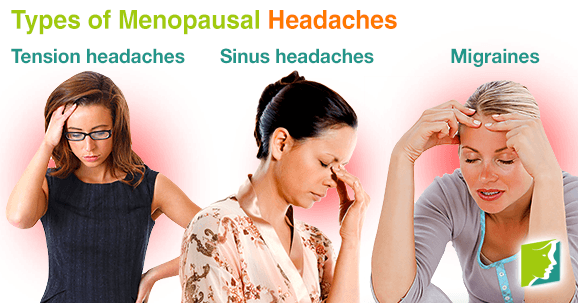The dull throbbing of a headache can be extremely uncomfortable and even unbearable. Approximately 47% of the American population is affected by headaches brought on by a range of factors, from diet and lifestyle to medication. For women in their forties and early fifties, intense, recurring, or constant headaches could be due to changing hormone levels before menopause. Keep reading to understand why perimenopausal women are prone to constant headaches, and learn what can be done to alleviate them.
Headaches and Menopause
Though the ultimate cause of headaches is not understood, it is generally accepted that a headache occurs when abnormal brain activity disrupts blood flow, causing inflammation of the blood vessels and pressure on the surrounding nerve pathways - in other words, pain. During perimenopause, fluctuations in hormone levels can cause the blood vessels in the brain to expand and contract sporadically, which makes headaches more common and intense.
Types of Menopausal Headaches
There are three primary types of headaches that women commonly experience during perimenopause: tension headaches, sinus headaches, and migraines.
Tension headaches. The most common form of headache - also known as an “everyday headache” - can last from 30 minutes to several hours. The pain has been likened to a tight band around the skull, though throbbing may also occur in the back of the neck and base of the skull during a tension headache.
Sinus headaches. This type is characterized by a feeling of facial tenderness and congestion around the forehead, eyes, and upper cheeks, where inflammation or blockage of the sinuses results in a dull throbbing in the sinus cavities.
Migraines. This is most intense and debilitating form of headache. These can last for several hours, and are often preceded by nausea or vomiting and sensitivity to light, sound, or odor.
Avoiding Triggers
While hormones primarily cause constant headaches during menopause, there are a number of other triggers that ought to be avoided to reduce the severity of headaches.
Bright, fluorescent lights, loud environments, and abrupt changes in temperature are frequently linked to headaches. Dietary triggers should also be avoided, such as junk foods and processed foods contain monosodium glutamate (MSG). Likewise, the consumption of nitrates - found in hot dogs and other preserved meats - and tyramine, found in soy products and smoked fish, may also trigger headaches.
Treating Menopausal Headaches
You can reduce the frequency and intensity of menopausal headaches via natural means. Both regular exercise and staying hydrated are important for preventing the onset of headaches. It may also help to increase your intake of phytoestrogenic compounds, found in soy products, nuts, and seeds, as these have an estrogenic action that could help restore the dwindling estrogen levels that contribute to menopausal headaches.
Though menopausal headaches are usually quick to pass, finding pain relief methods is important to minimize their impact on your lifestyle. Menopausal headaches are common, but they should not be debilitating or increasing in severity. If constant headaches are getting in the way of your professional, social, or personal life, it's important to consult your doctor to rule out any serious health concerns.
For more information on headaches and how to treat them, follow the links below.
Sources
- Better Health Channel. (2012). Headaches and hormones. Retrieved May 9, 2014, from http://www.betterhealth.vic.gov.au/bhcv2/bhcarticles.nsf/pages/Headache_and_hormones
- National Health Service UK. (2013). Headaches. Retrieved May 9, 2014, from http://www.nhs.uk/conditions/Headache/ Pages/Introduction.aspx
- National Health Service UK. (2013). Hormone headaches. Retrieved May 9, 2014, from http://www.nhs.uk/Livewell/headaches/Pages/Hormonalheadaches.aspx
- National Health Service UK. (2013). 10 surprising headache triggers. Retrieved May 9, 2014, from http://www.nhs.uk/Livewell/headaches/Pages/Headachetriggers.aspx
- National Institute of Neurological Disorders and Stroke. (2014). NINDS Migraine Information Page. Retrieved May 9, 2014, from http://www.ninds.nih.gov/disorders/migraine/migraine.htm
- Office on Women's Health. (2012). Migraine fact sheet. Retrieved May 9, 2014, from http://www.womenshealth.gov/publications/our-publications/fact-sheet/migraine.html




